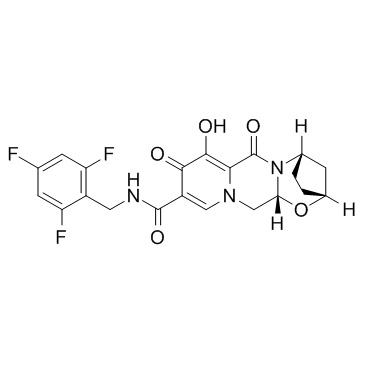1611493-60-7
| Name | Bictegravir |
|---|---|
| Synonyms |
bictegravir
GS-9883-01 UNII:8GB79LOJ07 (1S,11R,13R)-5-Hydroxy-3,6-dioxo-N-(2,4,6-trifluorobenzyl)-12-oxa-2,9-diazatetracyclo[11.2.1.0.0]hexadeca-4,7-diene-7-carboxamide GS-9883 (2R,5S,13aR)-8-hydroxy-7,9-dioxo-N-[(2,4,6-trifluorophenyl)methyl]-2,3,4,5,7,9,13,13a-octahydro-2,5-methanopyrido[1',2':4,5]pyrazino[2,1-b][1,3]oxazepine-10-carboxamide |
| Description | Bictegravir is a novel, potent inhibitor of HIV-1 integrase with an IC50 of 7.5 nM. |
|---|---|
| Related Catalog | |
| Target |
IC50: 7.5 nM (HIV-1 integrase)[1] |
| In Vitro | Bictegravir (BIC) inhibits the strand transfer activity with an IC50 of 7.5± 0.3 nM. Relative to its inhibition of strand transfer activity, Bictegravir is a much weaker inhibitor of 3′-processing activity of HIV-1 IN, with an IC50 of 241±51 nM. Bictegravir enhances the accumulation of 2-LTR circles ~5-fold relative to the mock-treated control and reduces the amount of authentic integration products in infected cells by 100-fold. Bictegravir potently inhibits HIV-1 replication in both MT-2 and MT-4 cells with EC50s of 1.5 and 2.4 nM, respectively. Bictegravir exhibits potent antiviral effects in both primary CD4+ T lymphocytes and monocyte-derived macrophages, with EC50s of 1.5±0.3 nM and 6.6±4.1 nM, respectively, which are comparable to values obtained in T-cell lines[1]. |
| Cell Assay | MT-2 cells are infected in bulk culture with HIV-1 IIIb at a cell density of 2×106 cells/mL for 3 h at 37°C. Infected MT-2 cells receive either DMSO (mock-treated control) or Bictegravir (BIC) at a final concentration greater than or equal to 20 times their respective antiviral 50% effective concentration (EC50). These plates are incubated at 37°C for either 12 h (for late reverse transcription product quantification) or 24 h (for 2-LTR circle and Alu-LTR product quantification), after which time the cells are harvested for total DNA isolation. DNA is extracted from each well using the DNA minikit and collected as a 100-μL eluate. TaqMan real-time PCR-quantified 2-LTR junctions (2-LTR circles), late reverse transcription products, and integration junctions (Alu-LTR) are normalized to the level of host globin gene in each sample[1]. |
| References |
| Density | 1.62±0.1 g/cm3 |
|---|---|
| Boiling Point | 682.5±55.0 °C at 760 mmHg |
| Molecular Formula | C21H18F3N3O5 |
| Molecular Weight | 449.380 |
| Flash Point | 366.6±31.5 °C |
| Exact Mass | 449.119843 |
| LogP | -1.26 |
| Vapour Pressure | 0.0±2.2 mmHg at 25°C |
| Index of Refraction | 1.664 |
| Storage condition | 2-8℃ |
| Water Solubility | Very slightly soluble (0.17 g/L) (25 ºC) |
